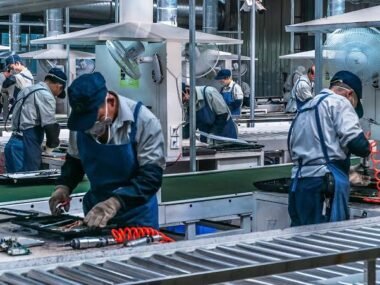The cleaning industry is a vital but often overlooked sector in the UK economy. Cleaners help keep environments sanitary and presentable in a wide range of commercial and domestic settings. As the demand for cleaning services has grown in recent decades, recruiting the right cleaners has become an increasingly crucial aspect of running successful cleaning businesses.
This guide provides an overview of multiple recruitment strategies and considerations for cleaning companies seeking to attract, onboard, and retain quality cleaners in the UK.
APPLY NOW:
Advertising Job Opportunities
The first step in recruiting cleaners is advertising available positions. Traditional strategies like print and television ads still have value but recruiting has largely shifted online. Posting job ads on job boards, company websites, and social media platforms allows cleaning businesses to reach a large number of potential applicants cost-effectively. Ads should provide crucial details like location, hours, compensation, and responsibilities.
They should highlight competitive benefits and emphasize career opportunities to attract committed candidates. Compliant equal opportunity statements are also important for ads. Consistent, multichannel advertising helps boost brand recognition and keeps vacant positions visible to job seekers.
Sources for Finding Qualified Applicants
In addition to online postings, cleaning companies have many options for finding qualified cleaner applicants. Local community and vocational colleges are good sources, as cleaning programs provide training relevant to the work. Staffing agencies that specialize in cleaning and hygiene services can pre-screen and refer experienced candidates.
Existing employees are valuable referral sources when incentive programs offer rewards for successful hires. With cleaning shortages in some areas, companies need to tap diverse sources and consider candidates who may not have traditional cleaning experience but demonstrate the right work ethic and customer service orientation.
Thorough Screening and Assessment
Given the responsibility of cleaning roles, especially those involving public environments and food preparation areas, screening applicants carefully is paramount. In-person or video interviews allow assessing communication skills and getting a sense of work style and priorities. Reference and background checks help verify candidates’ performance history and identify any red flags.
Practical skills tests evaluate proper cleaning techniques and ability to follow procedures. For roles involving equipment or chemicals, technical competence assessments are important. Thorough screening upfront reduces on-the-job issues later and protects customers, employees, and a company’s reputation.
Onboarding and Training Programs
New cleaner hires need orientation to adjust smoothly to company culture and work expectations. Onboarding elements like paperwork completion, uniform/equipment distribution, safety training, and introductions to coworkers set employees up for success.
Continual skills development is also vital. Initial and ongoing training programs reinforce proper cleaning methods, time management, customer service skills, and use of any machinery or technology. Trainees should practice under supervision until demonstrating competency.
Periodic refresher sessions keep veterans up-to-date on any policy/procedure changes. Investing in onboarding and training translates to higher quality work and retention of well-prepared cleaners long-term.
Benefits, Advancement, and Recognition
Beyond competitive pay, quality cleaning companies attract dedicated employees by offering robust benefit packages. Paid time off, health plans, and retirement savings options are increasingly standard. Flexible scheduling helps accommodate various lifestyles.
Internal job posting policies allow cleaners to apply for promotions as they gain experience. Even small perks like staff discounts and rewards programs boost morale.
Formally recognizing top performers through appreciation events and incentive trips builds pride in work and brand loyalty. Creative benefits strategies are especially important for cleaner recruitment and retention during labor shortages.
FAQs about Recruiting Cleaners in the UK
What are some common cleaner qualification requirements?
Requirements vary by employer and role requirements but often include physical ability to complete cleaning tasks, customer service skills, attention to detail, time management skills and previous cleaning or hygiene experience.
For some roles employers require training in health and safety, chemical handling or use of cleaning equipment. A valid work visa or citizenship is also required.
What are typical working hours and schedules for cleaners?
Cleaning work is often scheduled evenings, nights or weekends to avoid disrupting business operations during the day. Full time cleaners typically work 40 hours per week in shifts that can include early mornings, evenings and weekends.
Part time options averaging 20-30 hours per week are also common. Schedules may include split shifts or rotational coverage of evening/weekend duties between team members.
What is the average pay rate for cleaners in the UK?
The typical hourly pay range for cleaners in the UK is £8.20 to £11.40 depending on experience and any special duties. Employees with management responsibilities may earn up to £15 per hour. Average annual salaries are £14,000 to £20,000 for part-time positions and £18,000 to £25,000 for full-time roles. Rates tend to be higher in London and the Southeast regions of the UK.
How can cleaning staff be recruited during the COVID-19 pandemic?
During the pandemic, more hygiene and disinfection duties have increased the demand for cleaning workers. Recruitment methods have relied more heavily on virtual screening and online training to allow for social distancing.
Work-from-home recruitment tools have included video interviews, electronic onboarding paperwork and virtual orientation sessions using platforms like Microsoft Teams. Flexible schedules have helped accommodate childcare and other pandemic concerns. Adhering to health and safety guidelines builds employee confidence.
What questions should job applicants expect during a cleaning job interview?
Interviews for cleaner roles focus on assessing work history, customer service skills, cleaning experience and ability to complete physical tasks.
Common questions relate to previous responsibilities held; customer interactions; cleaning methods and equipment used; time management techniques; safety procedures knowledge; physical/medical limitations; motivation for work; strengths; areas for improvement and questions for the interviewer.
Hypothetical work scenario questions also gauge problem-solving and judgement. Documentation of legal eligibility to work is typically required.
